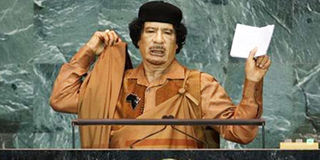Nigeria should be split, says Gaddafi as poll date is set

Libyan leader Muammar Gaddafi addresses the 64th United Nations General Assembly at the U.N. headquarters in New York on September 23, 2009. Photo/REUTERS
TRIPOLI, Tuesday
Nigeria should be divided into two nations to avoid further bloodshed between Muslims and Christians, Libyan leader Muammar Gaddafi has said.
In a speech to students, he praised the example of India and Pakistan, where he said partition saved many lives.
Splitting Nigeria “would stop the bloodshed and burning of places of worship,” state news agency Jana quoted him as saying.
A senior Nigerian diplomat said he was not taking the suggestion seriously.
Hundreds of people have died in communal violence in villages around the central Nigerian city of Jos this year.
The BBC’s Rana Jawad in Tripoli says Col Gaddafi’s suggestion is unsurprising given his past form.
Last year, he called for Switzerland to be abolished and for its land to be divided between Italy, Germany and France.
Although the violence in Nigeria generally takes place between Muslim and Christian communities, the underlying causes are a complex mix of political, social and economic grievances.
Nigeria is roughly split between its largely Muslim north, and a Christian-dominated south.
Col Gaddafi, until recently head of the African Union, characterised the Jos violence as a “deep conflict of religious nature” caused by the federal state, “which was made and imposed by the British in spite of the people’s resistance to it”.
He described the partition of India as a “historic, radical solution” which saved the lives of “millions of Hindus and Muslims”.
Splitting India in 1947 caused a breakdown of law and order in which at least 200,000 people died. Some estimates say one million people were killed.
About 12 million people were left homeless and thousands were raped.
An attempt by the Igbo people of south-eastern Nigeria to secede in 1967 sparked a war which left more than one million people dead.
Meanwhile, Nigeria’s presidential vote will be held on January 22, 2011 or April 23 depending on the outcome of electoral reforms before parliament, the West African country’s electoral body said today.
The current presidential term in Africa’s most populous nation ends in May 2011 and elections are due by April next year under the present system. But a reform bill before parliament could bring the polls forward.
The chairman of the Independent National Electoral Commission (INEC), Maurice Iwu, said that until a notice of poll is issued either on August 2, 2010 or November 1, the provisional dates could still be modified. “We have prepared two provisional schedules for the elections,” Mr Iwu said at a presentation in the capital Abuja, which was attended by a representative of Acting President Goodluck Jonathan.
“What this means is that whatever the National Assembly comes up with, it is incumbent on the commission to modify these dates to accommodate the provisions,” Mr Iwu said.
The presidential poll would be preceded by elections into the federal and state assemblies, and state governorships.
Mr Jonathan took over executive powers a month ago in the absence of ailing President Umaru Yar’Adua, who has since returned from three months in a Saudi hospital but remains too sick to govern the OPEC member nation of 140 million people.
Mr Jonathan’s takeover as acting leader ended immediate concerns about stagnation in government business but did not resolve the broader issue of who the country’s next president will be, a decision which will determine whether economic and political reforms accelerate or stagnate.
Nigeria’s political kingpins are jockeying for influence over who the ruling PDP party’s presidential nominee should be and some say an early election would end the uncertainty sooner.
Mr Jonathan said in a speech read at the presentation that the government wanted free and fair elections. A meeting of all political parties to discuss credible elections was being planned.
“We will do all within our powers to promote free and fair elections and we will insist on electoral justice,” Jonathan said in a speech read by Justice Minister Kayode Adetokunbo.
The elections that brought Yar’Adua to power in 2007 were so marred by vote-rigging, voter intimidation and ballot-stuffing that European Union observers dimissed them as not credible.
Parliament is considering electoral reforms including a suggestion made by former Chief Justice Muhammadu Uwais that elections should take place at least six months before the presidential term expires, allowing time to settle any legal challenges before the new president is sworn in.
The aim is to avoid a repeat of the legal battles that dogged the first half of Yar’Adua’s term and undermined his authority.
With the release of the timetable, campaigning for various political offices would soon kick-off in earnest in Africa’s top oil and gas producer, slowing down government business. (Agencies)




